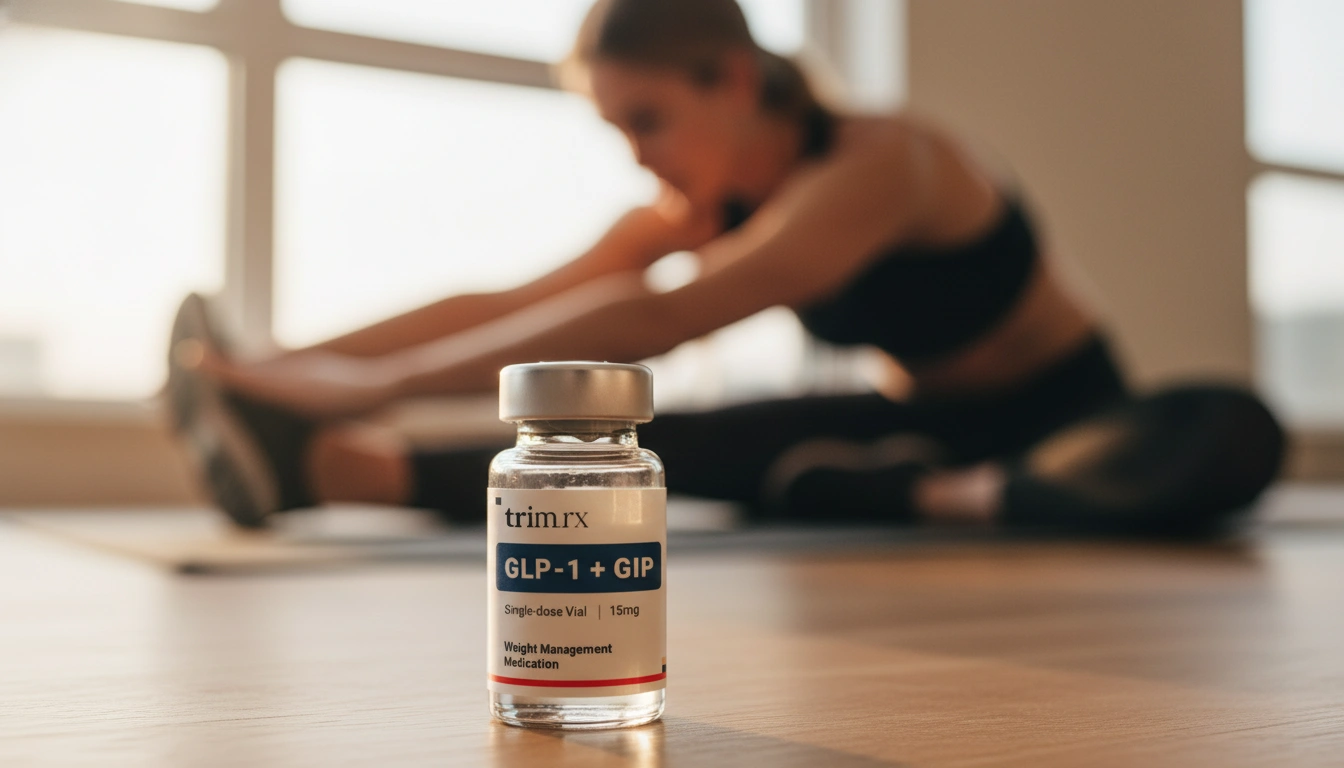Which GLP-1 is Best for Weight Loss?

Introduction
Have you ever wondered why some individuals seem to shed pounds effortlessly while others struggle despite their best efforts? The answer may lie in the advancements of medical science, specifically in the realm of weight loss medications. Among these, glucagon-like peptide-1 (GLP-1) receptor agonists have emerged as powerful tools in the fight against obesity and weight-related health issues.
In recent years, the popularity of GLP-1 medications has surged due to their effectiveness in promoting weight loss while also managing blood sugar levels for individuals with type 2 diabetes. However, as more options flood the market, many people find themselves asking, “Which GLP-1 is best for weight loss?” This question is not just about effectiveness; it encompasses various factors, including dosage, side effects, and individual health conditions.
At TrimRx, we believe in the power of personalized care and evidence-based solutions for weight loss. Our journey began with a mission to help individuals embrace healthier lifestyles through clinically proven methods, combining telehealth innovations with effective weight loss solutions. In this blog post, we will explore the landscape of GLP-1 medications, highlighting their mechanisms, benefits, and what makes each option unique. By the end, you will have a clearer understanding of which GLP-1 might be the best fit for your weight loss journey.
We will cover:
- Understanding GLP-1 and its Role in Weight Loss
- Overview of FDA-Approved GLP-1 Agonists
- Comparative Effectiveness of GLP-1 Medications
- Considerations for Choosing a GLP-1 Medication
- Integrating GLP-1 Medications with Lifestyle Changes
- Conclusion and Next Steps in Your Weight Loss Journey
Let’s dive deeper into the fascinating world of GLP-1 medications and uncover how they can aid in achieving your weight loss goals.
Understanding GLP-1 and its Role in Weight Loss
GLP-1, or glucagon-like peptide-1, is a hormone secreted by the intestines in response to food intake. Its primary functions include stimulating insulin secretion, inhibiting glucagon release, and enhancing feelings of fullness or satiety. These actions are particularly beneficial for those managing type 2 diabetes, but they also make GLP-1 agonists appealing for weight loss.
When we consume food, GLP-1 is released, signaling our body to lower blood sugar levels by promoting insulin release and slowing gastric emptying. This means that food stays in the stomach longer, enhancing the feeling of fullness and reducing overall calorie intake. The effect of GLP-1 on appetite can lead to significant weight loss over time.
In clinical studies, GLP-1 medications have demonstrated their ability to facilitate weight loss in individuals without diabetes as well. They work by mimicking the effects of the natural GLP-1 hormone, providing a multifaceted approach to weight management that addresses both appetite and glucose regulation.
Overview of FDA-Approved GLP-1 Agonists
Currently, several GLP-1 receptor agonists have received FDA approval, each with unique characteristics. Here’s a closer look at the most prominent options available for weight loss:
1. Semaglutide (Wegovy, Ozempic)
- Administration: Injectable, available in both weekly (Wegovy) and daily (Ozempic) formulations.
- Indication: Approved for weight management (Wegovy) and type 2 diabetes (Ozempic).
- Effectiveness: Clinical trials indicate that individuals using semaglutide can lose an average of approximately 15% of their body weight.
2. Tirzepatide (Mounjaro, Zepbound)
- Administration: Injectable, typically administered once a week.
- Indication: Approved for obesity management (Zepbound) and type 2 diabetes (Mounjaro).
- Effectiveness: Research has shown that tirzepatide may lead to even greater weight loss than semaglutide, with averages around 20-25% body weight loss in some studies.
3. Liraglutide (Saxenda, Victoza)
- Administration: Injectable, with daily dosage.
- Indication: Approved for weight loss (Saxenda) and type 2 diabetes (Victoza).
- Effectiveness: Studies indicate an average weight loss of 5-10% of body weight.
4. Dulaglutide (Trulicity)
- Administration: Injectable, administered weekly.
- Indication: Approved for type 2 diabetes; not specifically for weight loss but has been associated with some weight reduction.
- Effectiveness: Generally leads to modest weight loss, not primarily indicated for obesity management.
5. Exenatide (Byetta, Bydureon)
- Administration: Available in both daily (Byetta) and weekly (Bydureon) formulations.
- Indication: Approved for type 2 diabetes; weight loss effects are secondary.
- Effectiveness: Weight loss results are typically less pronounced compared to newer agents.
These GLP-1 medications not only help with weight management but also have additional benefits, such as improved cardiovascular health and reduced risk of complications associated with diabetes.
Comparative Effectiveness of GLP-1 Medications
When considering which GLP-1 is best for weight loss, it’s essential to look at the comparative effectiveness of these medications. Recent studies have provided valuable insights into how each medication performs in clinical trials.
Effectiveness Rankings
According to a systematic review that analyzed data from multiple trials, the effectiveness of GLP-1 medications for weight loss can be ranked as follows:
- Tirzepatide (Zepbound/Mounjaro): Demonstrated the highest average weight loss, often exceeding 20% in certain populations.
- Semaglutide (Wegovy): Following closely, with average weight loss around 15%.
- Liraglutide (Saxenda): Associated with moderate weight loss, typically around 5-10%.
- Dulaglutide and Exenatide: Generally lead to less significant weight loss, primarily focused on managing blood sugar levels in diabetes patients.
Side Effects and Considerations
While effectiveness is crucial, potential side effects also play a significant role in determining the best medication for each individual. Common side effects across GLP-1 medications include:
- Gastrointestinal Issues: Nausea, vomiting, diarrhea, and constipation are common, particularly when starting treatment or adjusting dosages.
- Injection Site Reactions: Redness or irritation at the injection site may occur.
- Risk of Hypoglycemia: Although rare, there is a potential for low blood sugar, especially when combined with other diabetes medications.
Each medication may present varying levels of these side effects, and individual responses can differ significantly. For instance, some patients may tolerate semaglutide well but experience more pronounced gastrointestinal side effects with tirzepatide.
Considerations for Choosing a GLP-1 Medication
Choosing the right GLP-1 medication is a personalized decision that should consider numerous factors, including:
- Individual Health Conditions: Those with a history of pancreatitis, thyroid cancer, or certain kidney disorders may have contraindications for some GLP-1 medications.
- Weight Loss Goals: The desired amount of weight loss can influence the choice of medication. Consideration of lifestyle factors, such as dietary habits and physical activity levels, is also essential.
- Administration Preference: Some individuals may prefer daily injections, while others may favor the convenience of weekly dosing.
- Tolerability and Side Effects: Past experiences with medications and how well one tolerates side effects should guide the selection process.
At TrimRx, we offer a personalized weight loss program that starts with a free assessment quiz to help determine your eligibility for prescription GLP-1 medications. This personalized approach ensures you receive a treatment plan tailored to your unique needs and health goals.
Integrating GLP-1 Medications with Lifestyle Changes
While GLP-1 medications can significantly aid in weight loss, they are most effective when combined with lifestyle changes. At TrimRx, we emphasize a holistic approach to weight management, including:
- Nutrition: A balanced diet is crucial. Incorporating whole foods, lean proteins, healthy fats, and plenty of vegetables can enhance the effects of GLP-1 medications.
- Physical Activity: Regular exercise not only boosts weight loss but also improves overall health. Aim for a combination of aerobic and strength-training activities.
- Behavioral Support: Behavioral modifications, such as mindful eating and stress management techniques, can help sustain weight loss efforts.
By integrating these lifestyle changes with the assistance of GLP-1 medications, individuals can achieve more sustainable results and improve their overall well-being.
Conclusion and Next Steps in Your Weight Loss Journey
Navigating the landscape of weight loss medications can be daunting, but understanding the available options is the first step toward achieving your goals. GLP-1 receptor agonists, including semaglutide, tirzepatide, and liraglutide, offer promising avenues for effective weight management. Each medication has its unique benefits, side effects, and administration methods, making personalized care essential.
At TrimRx, we are committed to supporting you throughout your weight loss journey. Our personalized programs combine advanced medical science with compassionate care, ensuring that you receive the guidance and support you need.
As you consider your options for weight loss, remember that a comprehensive approach—including both GLP-1 medications and lifestyle changes—can lead to the best outcomes.
FAQs
Which GLP-1 medication is considered best for weight loss currently available?
Tirzepatide (Zepbound/Mounjaro) is often considered the best GLP-1 for weight loss, producing average reductions of 15-22% body weight compared to 10-15% with semaglutide. TrimRx evaluates which GLP-1 is best for weight loss based on clinical data, individual patient factors, and tolerance profiles to determine the optimal GLP-1 for weight loss for each person.
How do I decide which GLP-1 is best for my weight loss goals?
Determining which GLP-1 is best for weight loss depends on your medical history, insurance coverage, side effect tolerance, and specific weight reduction targets. TrimRx conducts comprehensive assessments to identify which GLP-1 is best for weight loss in your situation, considering both the effectiveness of each GLP-1 for weight loss and practical accessibility factors.
Is semaglutide or tirzepatide the best GLP-1 for weight loss results?
While both are effective, tirzepatide generally edges out semaglutide as the best GLP-1 for weight loss in head-to-head comparisons showing 20-25% greater weight reduction. TrimRx explains which GLP-1 is best for weight loss by comparing efficacy data, though individual response determines the optimal GLP-1 for weight loss for each patient.
Which GLP-1 is best for weight loss if I have diabetes too?
Tirzepatide may be the best GLP-1 for weight loss in diabetic patients due to dual GLP-1/GIP receptor action providing superior glucose control alongside weight reduction. TrimRx considers diabetes status when determining which GLP-1 is best for weight loss, as the ideal GLP-1 for weight loss in diabetics must address both metabolic conditions simultaneously.
Does the best GLP-1 for weight loss change based on how much weight I need to lose?
The best GLP-1 for weight loss may indeed vary based on weight targets, with higher-efficacy options like tirzepatide preferred for significant weight reduction goals. TrimRx customizes recommendations about which GLP-1 is best for weight loss considering your starting BMI and how much the chosen GLP-1 for weight loss needs to help you achieve.
Which GLP-1 is best for weight loss considering side effect profiles?
While tirzepatide may be the best GLP-1 for weight loss efficacy-wise, semaglutide sometimes causes fewer gastrointestinal issues in sensitive individuals. TrimRx weighs which GLP-1 is best for weight loss by balancing effectiveness against tolerability, as the optimal GLP-1 for weight loss must be one you can sustain long-term.
Is oral or injectable the best GLP-1 format for weight loss?
Injectable formulations are currently the best GLP-1 options for weight loss, as oral semaglutide produces less weight reduction than injectable versions. TrimRx discusses which GLP-1 is best for weight loss while explaining that injectable GLP-1 medications for weight loss deliver superior results compared to oral alternatives.
Which GLP-1 is best for weight loss if cost is a major concern?
Compounded semaglutide often represents the best GLP-1 for weight loss when cost matters, offering significant savings compared to brand-name options. TrimRx helps determine which GLP-1 is best for weight loss within your budget, identifying affordable GLP-1 options for weight loss through manufacturer programs and compounding pharmacies.
Can the best GLP-1 for weight loss be different for men versus women?
Research doesn’t conclusively identify a gender-specific best GLP-1 for weight loss, though women sometimes report better results with certain formulations. TrimRx evaluates which GLP-1 is best for weight loss considering individual response patterns rather than assuming one GLP-1 for weight loss works uniformly better for either gender.
Will newer GLP-1 medications be even better for weight loss than current options?
Emerging triple-agonist medications may surpass current options as the best GLP-1 for weight loss, with early trials showing 25%+ body weight reductions. TrimRx stays informed about which GLP-1 is best for weight loss as new options emerge, though currently available GLP-1 medications for weight loss remain highly effective.
How do weekly versus daily injection schedules affect weight loss outcomes?
Weekly injections provide comparable or superior results to daily dosing while improving adherence through convenience. Most patients find weekly schedules easier to maintain long-term, which ultimately supports better sustained outcomes.
Do combination therapies with multiple medications enhance weight loss beyond single agents?
Combining different medication classes can sometimes produce additive effects, though this approach requires careful medical supervision. Single-agent therapy typically serves as the first-line approach before considering combination strategies.
How important is lifestyle modification when using these medications for weight management?
While medications provide powerful support, combining pharmaceutical treatment with nutrition improvements and regular exercise optimizes outcomes. The most successful patients view medication as one component of comprehensive lifestyle transformation rather than a standalone solution.
What role does individual metabolism play in determining which medication works best?
Genetic variations in drug metabolism, baseline insulin resistance, and gut microbiome composition all influence medication response. Personalized medicine approaches considering these factors may eventually guide more precise medication selection.
How do insurance coverage patterns affect practical medication choices for weight management?
Coverage policies vary dramatically between insurers and plan types, often determining which medications patients can realistically access. Prior authorization requirements, step therapy protocols, and formulary placement significantly impact real-world medication selection beyond pure clinical efficacy.

Transforming Lives, One Step at a Time
Keep reading
China’s Supreme Court Upholds Semaglutide Patent for Novo Nordisk
China’s Supreme People’s Court upholds Novo Nordisk’s semaglutide compound patent, supporting IP protection.
Over 600,000 Californians Risk Losing Access to GLP-1 Weight-Loss Drugs
California’s Medi-Cal will stop covering GLP-1 weight-loss drugs for weight-loss-only prescriptions, effective Jan. 1, 2026.
Weight-Loss Pill Approval Likely to Prompt Overhaul of Packaged Food and Fast-Food Products
FDA approval of GLP-1 weight-loss pills may prompt food makers and restaurants to shift to high-protein, smaller-portion products.



